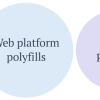I am 100% in favor of social media platforms taking a proactive stance against online harassment, bullying, threats, and the like. Sadly, few are doing much (if anything about it).
Tech companies also need to make their content moderation training materials publicly available so anti-hate advocates and the public can make sure the trainings accurately reflect what we need to feel safe on these platforms. Recent leaks of moderation materials have shown these documents to be woefully inadequate – one leak of a Facebook manual featured passages lifted straight from Wikipedia. When asked for comment by one media outlet, Facebook directed it to the “community standards” document the company released to the public. A $500 billion company such as Facebook should have higher standards than a college freshman rushing to finish a term paper.






